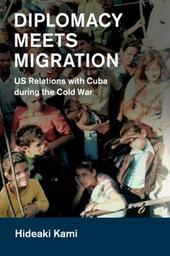
|
Diplomacy Meets Migration: US Relations with Cuba during the Cold War
Paperback / softback
Main Details
| Title |
Diplomacy Meets Migration: US Relations with Cuba during the Cold War
|
| Authors and Contributors |
By (author) Hideaki Kami
|
| Series | Cambridge Studies in US Foreign Relations |
|---|
| Physical Properties |
| Format:Paperback / softback | | Pages:376 | | Dimensions(mm): Height 230,Width 150 |
|
| Category/Genre | The Cold war |
|---|
| ISBN/Barcode |
9781108437547
|
| Classifications | Dewey:327.730729109045 |
|---|
| Audience | | Professional & Vocational | |
|---|
| Illustrations |
Worked examples or Exercises; 1 Maps; 9 Halftones, black and white
|
|
Publishing Details |
| Publisher |
Cambridge University Press
|
| Imprint |
Cambridge University Press
|
| Publication Date |
23 January 2020 |
| Publication Country |
United Kingdom
|
Description
Diplomacy Meets Migration examines diplomacy, migration, and the history of US relations with Cuba during the Cold War. Hideaki Kami draws on declassified US and Cuban diplomatic sources, as well as Miami-Cuban lobby records, to challenge traditional interpretations that mainly focus on the two national capitals, Washington and Havana. By incorporating Miami into the story of foreign affairs, Kami assesses the intersection between migration and diplomacy, and considers how migration emerged as a critical issue that shaped the dynamism of US relations with Cuba. Kami demonstrates that the US government reformulated its Cuban policy in response to Fidel Castro's institutionalization of power, while simultaneously trying to build a new relationship with the Miami Cuban community, a new, politically mobilized constituency within US society. He shows how both migration control and migrant politics became important components of US foreign policy, which in turn influenced Cuban policy toward the United States.
Author Biography
Hideaki Kami is an Assistant Professor in the Faculty of Foreign Languages at Kanagawa University, Japan. He is a recipient of the Saito Makoto Prize and the Fulbright Award for Doctoral Studies, and has conducted archival research in the United States, Cuba, and elsewhere.
Reviews'Kami has fashioned a compelling assessment of Cuban immigration as a factor of decisive policy importance, and thereupon to plumb deeply into the complexities of Cuba-US relations between the 1960s and the 1990s. He answers some old questions and, just as important, he has raised new ones.' Louis A. Perez, The American Historical Review 'Using an impressive array of multinational sources, Hideaki Kami weaves the compelling tale of how Cuba's migration became ultra-politicized and how, in turn, it sabotaged US diplomatic relations with the Castro regime. Never again should we discuss US-Cuban relations without due consideration for the Cuban diaspora.' Alan McPherson, author of Yankee No! 'Diplomacy Meets Migration will find a prominent place on the shelves of scholars of the Cold War, immigration, and American politics. Smartly written and compellingly argued, this book reveals how leaders in Miami, Havana, and Washington, DC managed the complex political and policy issues arising at the intersection of diplomacy and migration. In telling this story, Hideaki Kami recasts our understanding of Cuban-American relations and shows himself as one of the best young historians of migration and America and the World.' Carl Bon Tempo, author of Americans at the Gate: The United States and Refugees during the Cold War 'Kami's transnational approach to narrating how Cuban migrants actively shaped the US 'national interest' is valuable to scholars of international migration ... To interlace previously disparate threads of Washington, Havana, and Miami's relationships with one another, Kami draws on an impressive range of sources.' Melissa Hampton, International Migration Review 'Kami's remarkable study reminds us that migration remains a historical constant. Rare is the nation that exists without some portion of its citizens living abroad.' Jonathan C. Brown, Diplomatic History 'Diplomacy Meets Migration is based on an impressive range of sources, including (recently declassified) US and Cuban government archives, records of Cuban-American lobby groups, and supporting materials from the diplomatic records of Canada, Japan, Mexico and the United Kingdom. The insights that Kami derives from these archives, as well as secondary sources that range from diplomatic histories to sociological studies, add up to an original analysis of US-Cuban relations throughout the Cold War.' Jorrit van den Berk, Diplomatica 'Analysts disagree about how to explain a state's foreign policies. One group focuses on the effects the power distribution among states has on the actions of a state; a second group emphasizes the role of domestic politics; and a third concentrates on the ideas and beliefs of the state's leaders. Kami's excellent analysis transcends those artificial boundaries ... he identifies the multiple external factors that affected the complex interactions between Havana, Washington, and Miami.' Alex Roberto Hybel, The Americas
|